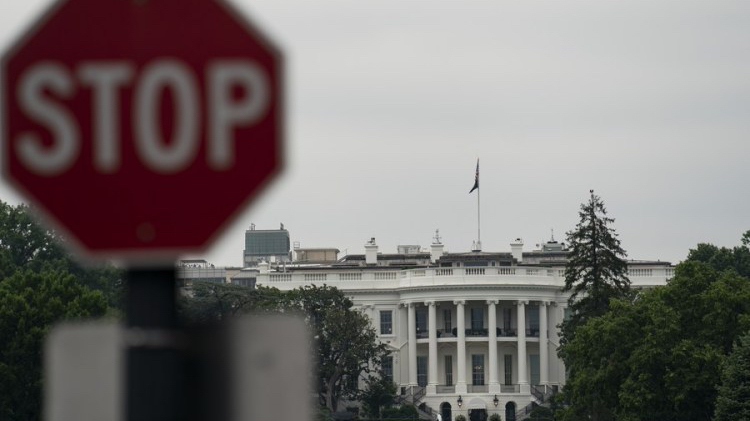
The White House and a stop sign in Washington, D.C., the United States, June 22, 2022. /Xinhua
The White House and a stop sign in Washington, D.C., the United States, June 22, 2022. /Xinhua
Editor's note: Hayat Bangash is a freelance columnist on international affairs with degrees in business administration and war studies. The article reflects the authors' opinions, and not necessarily the views of CGTN.
Two months after the downing of the Chinese civilian unmanned airship, NBC News on Monday cited two current senior U.S. officials and one former senior administration official as saying that the balloon was able to transmit the gathered intelligence about U.S. military sites back to Beijing in real time, even though the White House and the Pentagon could not confirm the account, according to Reuters.
The downing of the unmanned airship on February 4, 2023 has given geopolitical analysts new insights into the strategic behavior of the U.S. While the U.S. used the incident to revitalize the anti-China rhetoric, it exposed some underlying insecurities that motivated it to carry out this act.
Anti-China rhetoric had been steadily building in the U.S. since the presidency of Donald Trump, who was a symptom, rather than the cause, of a larger problem in American society. As the rhyming history has shown, populist governments take hold of the U.S. after financial crises: The Great Depression of the 1930s led to the populist ascendency of Franklin Roosevelt and the Global Financial Crisis of 2008 culminated in that of Trump.
Trump placed the blame for all the economic ills of his country on China, started a trade war of sorts, and pushed the world's largest economy into a protectionist pit. The scapegoat that Trump provided in the form of China came in handy. He was able to hide his inability to revive the American economy as the public remained distracted by an aggressive, yet incoherent foreign policy.
Likewise, the slim majority that brought Joe Biden into office is also trying to establish its legitimacy in the foreign policy domain. So when a civilian meteorological airship popped up in the sky after years of mounting anti-China rhetoric, something had to be done.
Theorists explain this hysterical behavior of the U.S. under the diversionary theory of war. While there might not be a war happening right now, the diversion provided by the shooting down of the airship was from an array of domestic issues.
The most prominent domestic problems in the U.S. include extreme polarization on both sides of the aisle where the House has a majority of Republicans and the Senate is in the hold of Democrats, discussions on gun control and abortion laws are becoming increasingly divisive, racism is showing no signs of respite, and trust in law enforcement is tremendously low.
This mess is clearly reflected in the U.S.'s foreign policy. As Richard N. Haass, president of the U.S.-based Council on Foreign Relations, has been advising his compatriots that "foreign policy begins at home," it is important for the U.S. government to put its house in order.

Wang Yi, a member of the Political Bureau of the Communist Party of China (CPC) Central Committee and director of the Office of the Foreign Affairs Commission of the CPC Central Committee, answers questions at the Munich Security Conference in Munich, Germany, on February 18, 2023. /Xinhua
Wang Yi, a member of the Political Bureau of the Communist Party of China (CPC) Central Committee and director of the Office of the Foreign Affairs Commission of the CPC Central Committee, answers questions at the Munich Security Conference in Munich, Germany, on February 18, 2023. /Xinhua
The foreign policy of the U.S. matters for the rest of the world because the country is one of the major powers of today. It might be the first time that the U.S. has worn these shoes, but China has been playing a global role for centuries. This role has instilled strategic patience among Chinese policymakers who bear long-term perspectives of geopolitical events.
As pointed out by George Friedman, a strategist on international affairs, the U.S. is a headstrong power that is also immature. So when it acts like a bull in a china shop, its overreaction can cause damage to its relations with other major powers who behave differently when faced with incidents like the balloon episode.
To learn from China, American balloons have overflown Chinese territory over 10 times since last year. Being a responsible country, China abided by international law which has provisions for force majeure incidents that are exempt from legal liability for being uncontrollable.
This adherence to international law by China contrasts with the U.S. rhetoric of adhering to the elusive concept of a rules-based international order. Experts of international law believe that such use of language by American policymakers is a clever play on words since the "rules-based international order" remains ill-defined.
Force majeure incidents will continue to test American sincerity in improving relations with China. The balloon incident is not the first and might not be the last. Today it was a Chinese civilian airship, tomorrow another object can be from another country. What the world will be observing is how the U.S. continues to handle such incidents. Will it maintain the downward spiral toward a Cold War mentality or will it take these incidents as opportunities to build mutual trust?
The way major powers behave in these situations has consequences for their bilateral relations. The U.S. and China are the world's two largest economies with roles in global growth and setting examples for other nations. Yes, competition between the U.S. and China is natural but it needs to be played by the rules and by international law to engender win-win outcomes.
The U.S. needs to reconcile with the fact that its unipolar moment has passed. It should not consider other rising powers as rivals and instead learn from them how they are gaining their global status. Mere shows of force will not compensate for the relative – if not absolute – decline in American power.
(If you want to contribute and have specific expertise, please contact us at opinions@cgtn.com. Follow @thouse_opinions on Twitter to discover the latest commentaries in the CGTN Opinion Section.)